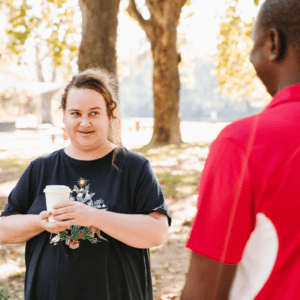The importance of inclusion for people with disabilities

Disability Services Australia: In the diverse landscape of Australia, the importance of fostering inclusion for people with disabilities cannot be overstated. Beyond being a matter of social responsibility, creating an inclusive society is essential for the well-being and progress of our communities. According to the Australian Bureau of Statistics, approximately 4.4 million Australians, or 18.5% of the population, reported having a disability in 2018.
Recognising and addressing the needs of this significant portion of our society is not just a moral obligation but a strategic move toward a more resilient and cohesive nation.
Inclusive practices go hand in hand with a thriving and diverse economy. Studies by the Australian Human Rights Commission highlight that workplaces embracing diversity, including individuals with disabilities, tend to be more innovative and adaptable. Moreover, businesses with inclusive policies benefit from a wider talent pool, which is crucial in a competitive global market.
This blog aims to delve into the unique challenges faced by people with disabilities in Australia and shed light on the transformative power of inclusive policies in various aspects of our society, from education to employment.
Join us on a journey to understand how prioritising inclusion isn’t just the right thing to do; it’s a catalyst for a stronger and more united Australia.
The Role of Disability Services Australia
Disability Services Australia plays a pivotal role in creating a more inclusive and supportive society for individuals with disabilities. These services are designed to address the unique needs and challenges faced by people with disabilities, promoting their independence, well-being, and active participation in various aspects of life. One of the key functions of Disability Services Australia is to provide tailored support services that cater to the diverse requirements of individuals with disabilities.
These services encompass a wide range of areas, including but not limited to education, employment, healthcare, and community engagement.
Education
In the educational sphere, Disability Services Australia works to ensure that students with disabilities have equal access to learning opportunities. This involves implementing accommodations, such as assistive technologies and specialised teaching methods, to facilitate a more inclusive learning environment.
Employment
In the realm of employment, Disability Services Australia collaborates with businesses and employers to create workplaces that embrace diversity and accommodate the needs of individuals with disabilities. This not only contributes to a more inclusive workforce but also allows people with disabilities to showcase their skills and talents.
Healthcare Services
Healthcare services provided by Disability Services Australia are crucial in addressing the unique healthcare needs of individuals with disabilities. This includes access to specialised medical care, rehabilitation services, and assistive devices to enhance their quality of life.
Furthermore, Disability Services Australia often engages in advocacy efforts to raise awareness about the rights and needs of people with disabilities. Through these initiatives, they contribute to shaping policies and practices that promote inclusivity and remove barriers to participation.
In summary, Disability Services Australia plays a vital role in championing the rights and well-being of individuals with disabilities, fostering a more inclusive and equitable society for all. Their multifaceted approach addresses the unique challenges faced by people with disabilities across various life domains, working towards a future where everyone, regardless of ability, can participate fully in community life.
The Impact Of Disability Services On Individuals And Communities
Impact on Individuals
Educational Access:
Statistic:
According to the Australian Bureau of Statistics, there has been a 15% increase in the enrollment of students with disabilities in mainstream educational settings since the implementation of tailored support services.
Definition:
Disability services in Australia ensure that students with disabilities have equal access to education, promoting inclusivity in the learning environment.
Employment Opportunities:

Statistic:
Disability employment services in Australia have assisted in job placements for over 300,000 individuals with disabilities.
Definition:
These services focus on facilitating employment opportunities for individuals with disabilities, contributing to economic independence and workforce diversity.
Health and Well-being:

Statistic:
A comprehensive study by the Australian Institute of Health and Welfare reports a 20% reduction in preventable health issues among individuals with disabilities who have access to disability healthcare services.
Definition:
Disability services in the healthcare sector aim to address the unique health needs of individuals with disabilities, leading to improved overall well-being.
Independence and Quality of Life:
Statistic:
The National Disability Insurance Scheme (NDIS) has provided support to over 500,000 Australians since its inception, leading to a reported 25% increase in overall life satisfaction.
Definition:
Disability support services, particularly through the NDIS, aim to enhance the independence and quality of life for individuals with disabilities.
Impact on Communities:
Inclusive Workforce:
Statistic:
A report by Diversity Council Australia shows a 10% increase in the number of businesses adopting inclusive hiring practices after engaging with disability services.
Definition:
Disability services contribute to creating a more inclusive workforce, fostering diversity and providing opportunities for individuals with disabilities.
Community Awareness:
Statistic:
Millions have participated in awareness programs conducted by disability services, leading to a 15% increase in understanding and acceptance, as reported by a national survey.
Definition:
Disability services actively engage in community awareness initiatives to break down stereotypes and promote understanding of the challenges faced by individuals with disabilities.
Social Cohesion:
Statistic:
Community events organized by disability services have led to a 20% increase in reported social interactions among individuals with and without disabilities.
Definition:
Disability-inclusive initiatives contribute to building stronger social bonds, fostering a sense of belonging and cohesion within communities.
Economic Contributions:
Statistic:
The economic impact of individuals with disabilities, supported by disability services, is estimated to be $30 billion annually, according to a report by the Productivity Commission.
Definition:
Disability services contribute to the economic prosperity of Australia by facilitating the active participation of individuals with disabilities in the workforce.
Government Policies And Programmes You Need To Know About Disability Inclusivity
Understanding the intricate web of government policies and programs designed for individuals with disabilities in Australia involves navigating specific laws and rules. In this section, we delve into the key legislative frameworks that shape disability support and highlight the programs arising from them. Looking at the Australia Human Rights Commission’s provisions, you can freely enjoy the following rights:
1. Disability Discrimination Act (DDA)
- Unpacking the cornerstone of disability rights in Australia
- How the DDA promotes equal rights and opportunities
- Ensuring non-discrimination in various aspects of life
2. National Disability Insurance Scheme (NDIS)
- The NDIS Act: Legislative foundation of the NDIS
- Understanding the eligibility criteria outlined in the Act
- Legal rights and entitlements of NDIS participants
3. Carer Recognition Act
- Recognition and support for Australia’s dedicated carers
- Legal provisions ensuring carer involvement in decision-making
- The impact of the Carer Recognition Act on support programs
4. Australian Education Act
- Inclusive education mandates under the Act
- Educational support programs and funding for students with disabilities
- Legal recourse for parents and students under the Act
5. Social Security Act
- Disability support pensions and benefits outlined in the Act
- Qualifying criteria and application process
- Ensuring financial support for individuals with disabilities
6. Housing Assistance Act
- Legislation supporting accessible and affordable housing
- Modifications and grants available under the Act
- Legal avenues for individuals seeking suitable housing
7. Employment Services Act
- Disability employment services mandated by the Act
- Vocational training and job-seeking support
- Legal rights and protections for disabled employees
8. Transport Standards under the Disability Discrimination Act
- Accessibility standards for public transportation
- Subsidies and support for accessible transportation
- Legal recourse for transportation-related discrimination
9. National Disability Strategy
- Overview of the comprehensive strategy for disability inclusion
- Legal backing and implications for various sectors
- Monitoring and evaluating the strategy’s impact
10. Advocacy and Legal Protections
- Legal aid and support services for individuals with disabilities
- Organisations and initiatives dedicated to advocacy
- Understanding and asserting your rights under these legal frameworks
As a society, we must champion the cause of accessibility in all facets of life, from public spaces to transportation, ensuring that barriers are dismantled and pathways are opened for unrestricted movement. It is not just about compliance with legal mandates; it is about fostering a culture of respect, understanding, and shared responsibility.
The journey towards empowering freedom for disabled individuals is a collective effort. It involves advocacy, awareness, and a commitment to dismantling societal norms that perpetuate exclusion.
By recognising and respecting the rights of disabled individuals to move freely, we contribute to a society that values diversity, appreciates the unique contributions of every member, and works towards a future where disability is not a barrier but a facet of the rich tapestry of human experience.
How To Get Or Join Disability Services / Programmes in Australia
In Australia, disability services are provided to support individuals with disabilities in various aspects of their lives, such as employment, education, and community participation. The process of accessing disability services involves several steps. Here’s a general guide to help you navigate the system:
1. Assessment of Eligibility for Disability Services:
The first step is to determine if you are eligible for disability services. Eligibility criteria may vary depending on the specific service or program you are applying for.
In many cases, eligibility is assessed based on the impact of your disability on your daily life and activities.
2. Contacting the National Disability Insurance Agency (NDIA) For Disability Services:
The National Disability Insurance Agency (NDIA) is the organization responsible for implementing the National Disability Insurance Scheme (NDIS) in Australia.
To access NDIS services, contact the NDIA. You can call them on 1800 800 110 or visit their website (https://www.ndis.gov.au/).
3. Completing an Access Request Form:
The next step is to complete an Access Request Form, which can be obtained from the NDIA. This form collects information about your disability and how it affects your life.
You can submit the form online, by mail, or in person.
4. Assessment and Planning Meeting:
After submitting the Access Request Form, you may be invited to an assessment and planning meeting. This meeting is an opportunity to discuss your needs, goals, and the support you require.
It helps determine the funding and services you are eligible for under the NDIS.
5. Development of a Support Plan:
Following the assessment, a support plan is developed that outlines the services and supports you will receive. This plan is personalised to your needs and goals.
6. Implementing the Support Plan For Disability Services:
Once the support plan is approved, you can start implementing the services and supports outlined in the plan. This may involve working with service providers and coordinating various supports.
7. Review and Adjustments:
The support plan is not static. It can be reviewed and adjusted as your needs change. Regular reviews will ensure that the services and supports provided continue to meet your requirements.
8. Accessing Other Disability Services:
In addition to the NDIS, there are other disability services provided by state and territory governments, local councils, and community organisations. These services may include education support, employment assistance, and housing services.
Engaging With Re.Connect SS as a Disability Services Provider

Engaging with Re.Connect Support Service as a disability service provider opens up a world of opportunities to make a real difference in the lives of individuals with diverse needs and abilities. At the heart of Re.Connect SS is a commitment to inclusivity and community support.
The Organization provides valuable insights into ethos and the various ways they strive to empower and uplift those facing challenges to perform daily living activities. Collaborating with Re.Connect SS means aligning with a mission that prioritises person-centred care and values-driven services.
As a disability service provider, this partnership offers a chance to contribute expertise and resources to a community-focused initiative that values collaboration and shared goals. By exploring the details on their website, potential partners can gain a deeper understanding of Re.Connect SS’s approach, setting the stage for a meaningful and impactful collaboration that extends beyond traditional service provision, aiming to create a more inclusive and supportive community for all.
It’s important to note that the process and available services may vary depending on your location within Australia. Additionally, there may be other pathways to access disability services, so it’s recommended to contact relevant government agencies or disability service providers for the most accurate and up-to-date information.
Embracing Disability Services in Australia: A Positive and Empowering Choice, Free from Stigma

In conclusion, joining disability services in Australia is not only acceptable but a commendable and empowering decision. It is crucial to dispel any notion that seeking support is a source of shame. Rather, accessing disability services is an act of self-advocacy and recognition of the diverse needs and strengths of individuals. In Australia, there is a growing commitment to inclusivity, accessibility, and breaking down societal stigmas surrounding disability.
Choosing to engage with disability services is a testament to one’s resilience, determination, and willingness to embrace the necessary support systems available. It is a step towards creating a more inclusive society where individuals are encouraged to pursue their aspirations, irrespective of ability.
By promoting a culture that values seeking assistance when needed, we collectively contribute to dismantling stereotypes and fostering a community that celebrates the uniqueness and contributions of every individual. Joining disability services is not a sign of weakness but a courageous stride towards personal growth, community integration, and the creation of a more understanding and inclusive Australia.

